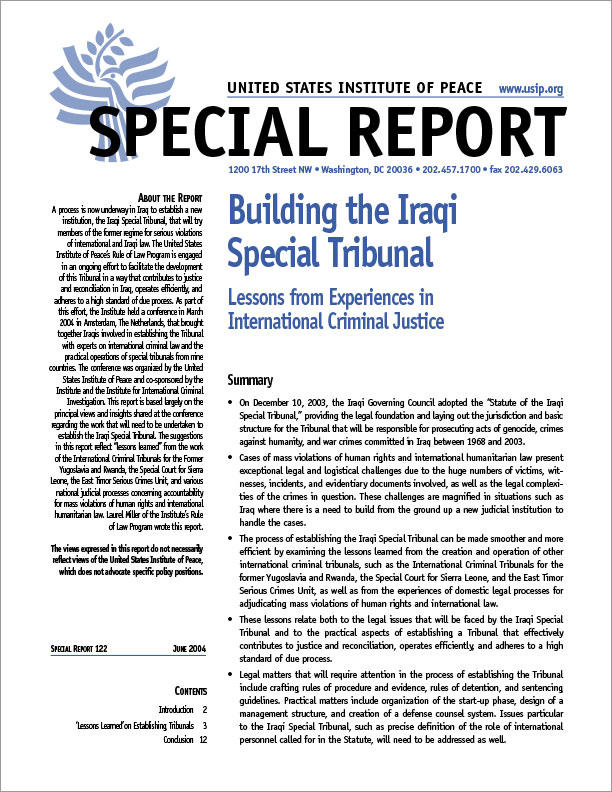Building the Iraqi Special Tribunal: Lessons from Experiences in International Criminal Justice
A process is now underway in Iraq to establish a new institution, the Iraqi Special Tribunal, that will try members of the former regime for serious violations of international and Iraqi law. The United States Institute of Peace’s Rule of Law Program is engaged in an ongoing effort to facilitate the development of this Tribunal in a way that contributes to justice and reconciliation in Iraq, operates efficiently, and adheres to a high standard of due process.

Summary
- On December 10, 2003, the Iraqi Governing Council adopted the "Statute of the Iraqi Special Tribunal," providing the legal foundation and laying out the jurisdiction and basic structure for the Tribunal that will be responsible for prosecuting acts of genocide, crimes against humanity, and war crimes committed in Iraq between 1968 and 2003.
- Cases of mass violations of human rights and international humanitarian law present exceptional legal and logistical challenges due to the huge numbers of victims, witnesses, incidents, and evidentiary documents involved, as well as the legal complexities of the crimes in question. These challenges are magnified in situations such as Iraq where there is a need to build from the ground up a new judicial institution to handle the cases.
- The process of establishing the Iraqi Special Tribunal can be made smoother and more efficient by examining the lessons learned from the creation and operation of other international criminal tribunals, such as the International Criminal Tribunals for the former Yugoslavia and Rwanda, the Special Court for Sierra Leone, and the East Timor Serious Crimes Unit, as well as from the experiences of domestic legal processes for adjudicating mass violations of human rights and international law.
- These lessons relate both to the legal issues that will be faced by the Iraqi Special Tribunal and to the practical aspects of establishing a Tribunal that effectively contributes to justice and reconciliation, operates efficiently, and adheres to a high standard of due process.
- Legal matters that will require attention in the process of establishing the Tribunal include crafting rules of procedure and evidence, rules of detention, and sentencing guidelines. Practical matters include organization of the start-up phase, design of a management structure, and creation of a defense counsel system. Issues particular to the Iraqi Special Tribunal, such as precise definition of the role of international personnel called for in the Statute, will need to be addressed as well.
- Based on the experience of other similar tribunals as described by the experts at the Amsterdam meeting, this report provides recommendations concerning each of the above issues, as well as others ranging from the importance of establishing a strong public outreach program early in the Tribunal’s life cycle, to the impact of defense counsel fee arrangements on the pace of trials, to the value of separating trial and sentencing phases of proceedings.
About the Report
A process is now underway in Iraq to establish a new institution, the Iraqi Special Tribunal, that will try members of the former regime for serious violations of international and Iraqi law. The United States Institute of Peace’s Rule of Law Program is engaged in an ongoing effort to facilitate the development of this Tribunal in a way that contributes to justice and reconciliation in Iraq, operates efficiently, and adheres to a high standard of due process.
As part of this effort, the Institute held a conference in March 2004 in Amsterdam, The Netherlands, that brought together Iraqis involved in establishing the Tribunal with experts on international criminal law and the practical operations of special tribunals from nine countries. The conference was organized by the United States Institute of Peace and co-sponsored by the Institute and the Institute for International Criminal Investigation. This report is based largely on the principal views and insights shared at the conference regarding the work that will need to be undertaken to establish the Iraqi Special Tribunal. The suggestions in this report reflect “lessons learned” from the work of the International Criminal Tribunals for the Former Yugoslavia and Rwanda, the Special Court for Sierra Leone, the East Timor Serious Crimes Unit, and various national judicial processes concerning accountability for mass violations of human rights and international humanitarian law. Laurel Miller of the Institute’s Rule of Law Program wrote this report.
The views expressed in this report do not necessarily reflect views of the United States Institute of Peace, which does not advocate specific policy positions.



